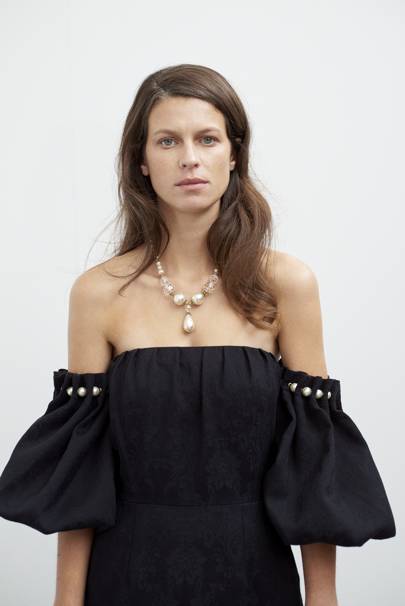Of course, no one wants the planet or its people to suffer for the sake of fashion. But while we may lose sleep over the dyes in our denim and the microfibres escaping into the water supply every time we wash our favourite yoga leggings, all thoughts of carefully checking material composition and only buying something when we really, really love it seem to disappear in a puff of delight once a party invitation drops into the inbox.
By its very nature, eveningwear is hardly a sustainable category, even if it’s rendered in organic silk. Most of the evening dresses in your wardrobe will likely have been purchased for a one-wear-only special event. Party looks deserve to be replayed, like your favourite dancefloor anthem, as one Vogueeditor has opined. But, often, they’re still hanging in their dry-cleaning wrappers once party season rolls round again.
That’s set to change thanks to Amy Powney, one of the most clued up designers on the subject of sustainable fashion that has ever set foot in Vogue House. The creative director of Mother of Pearl has been on a mission to convert her brand into one that’s able to call itself ethical and sustainable – and, unlike the numerous labels who have recently jumped on the eco bandwagon, actually mean it.
That’s set to change thanks to Amy Powney, one of the most clued up designers on the subject of sustainable fashion that has ever set foot in Vogue House. The creative director of Mother of Pearl has been on a mission to convert her brand into one that’s able to call itself ethical and sustainable – and, unlike the numerous labels who have recently jumped on the eco bandwagon, actually mean it.
Cognisant of the environmental and social impact of fashion, Powney spent two-and-a-half years tracing supply chains, crunching air miles, auditing factories and agonising over packaging to create No Frills, her fully sustainable fashion collection, which launched in September. Earlier this year she launched sustainable wedding dresses. Now, she is venturing into eveningwear.

The highlight is a black off-the-shoulder dress (recently debuted by Gabriella Wilde) in heavy jacquard, which boasts organic cotton and mulesing-free wool (mulesing is a cruel process that removes skin from the breech of a young sheep without anaesthetic) from Uruguay. This jostles for attention with digitally-printed floral dresses rendered in peace silk (a cruelty-free alternative to silk whereby the silkworm emerges unharmed from its cocoon) and also featuring a bamboo lining (which has a low environmental impact). Mini dresses with puffball sleeves are crafted in viscose derived from sustainable forestry, with a new tree planted every time a mature tree is cut down.
It hasn’t been easy. “It’s definitely harder to source sustainable fabrics for eveningwear. Organic cotton and denim are fairly developed industries but the more luxurious, fancy end of fashion hasn’t evolved at all,” says Powney. “Peace silk, for instance, is incredibly expensive – we have sourced ours from India and digitally printed it in the UK, which is much more sustainable than other methods of printing – and it’s been complicated to get the product looking great without impacting the price point as well as not cutting corners.”

The highlight is a black off-the-shoulder dress (recently debuted by Gabriella Wilde) in heavy jacquard, which boasts organic cotton and mulesing-free wool (mulesing is a cruel process that removes skin from the breech of a young sheep without anaesthetic) from Uruguay. This jostles for attention with digitally-printed floral dresses rendered in peace silk (a cruelty-free alternative to silk whereby the silkworm emerges unharmed from its cocoon) and also featuring a bamboo lining (which has a low environmental impact). Mini dresses with puffball sleeves are crafted in viscose derived from sustainable forestry, with a new tree planted every time a mature tree is cut down.
It hasn’t been easy. “It’s definitely harder to source sustainable fabrics for eveningwear. Organic cotton and denim are fairly developed industries but the more luxurious, fancy end of fashion hasn’t evolved at all,” says Powney. “Peace silk, for instance, is incredibly expensive – we have sourced ours from India and digitally printed it in the UK, which is much more sustainable than other methods of printing – and it’s been complicated to get the product looking great without impacting the price point as well as not cutting corners.”
Powney admits there are improvements to be made. Often the sustainability credentials of a particular fabric have to be offset by another factor. Take viscose. “Viscose has two major issues. First, it’s a cellulose fabric which means it comes from wood pulp, and deforestation is a huge issue. Sustainable forestry is imperative and is what we have sought out,” she admits. “The second is the chemical process used in its creation. We are moving more and more into using Tencel as the process involved in its creation is much less aggressive – so we will be launching Tencel pieces in March.”
Her proudest accomplishment is the jacquard fabric used to make the Emmie dress, one of her favourites in the line-up. “I personally traced this fabric’s journey, from the mulesing-free sheep farms run by Pedro in Uruguay, who I visited, to the spinners and developed the design with the weavers in Austria,” she says. “It was so complex trying to create a luxurious jacquard in a sustainable way so this fabric feels like a huge achievement.” She pauses. “The cotton is GOTS certified from Egypt.” This is a woman who knows her stuff. But the kudos lies in the fact that these dresses are seriously desirable, too.
Mother of Pearl's sustainable eveningwear collection launches on November 14 2018 at Motherofpearl.co.uk.
Mother of Pearl's sustainable eveningwear collection launches on November 14 2018 at Motherofpearl.co.uk.

No comments:
Post a Comment